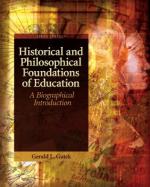
|
1. Gerald L Gutek wrote this updated Fourth Edition of Historical and Philosophical Foundations of Education: A Biographical Introduction in 2005. What were Gutek's history and qualifications for writing the book?
Gerald Gutek spent thirty years teaching history and philosophy of education at major universities. He states that this work effectively presents his idea "educational biography is a valuable, powerful, but too-often neglected" learning tool about how education and transforming events and trends are interconnected through history and the world.
2. How does Gutek incorporate historical approaches in relation with modern ideas?
Gutek discusses educators in their historical context and compares and contrasts them with relevant trends and conditions. Gutek assumes educators interacted with culture that influenced development of educational ideas with significance.
3. What is the basic progression of Gutek's examination of the people featured in the text?
Gutek begins with ancient Confucius and Greco-Romans Plato, Aristotle and Quintilian followed by medievalists Aquinas and Erasmus. The Protestant Reformation is introduced with Calvin and Comenius' pansophism or all-knowledge. Rousseau and Pestalozzi's educational reform is presented and Enlightenment brings Americanization with Jefferson, Wollstonecraft and Mann. Education for social change and reconstruction was introduced by Owen; Froebel promoted kindergarten. Mill and Spencer proposed liberalism and Addams advocated socialized education. Dewey's pragmatism tested Darwin and Montessori internationalized child education. Gandhi, Du Bois and Freire represent India, African Americans and Brazil.
(read all 60 Short Essay Questions and Answers)
|
This section contains 4,379 words (approx. 15 pages at 300 words per page) |

|




